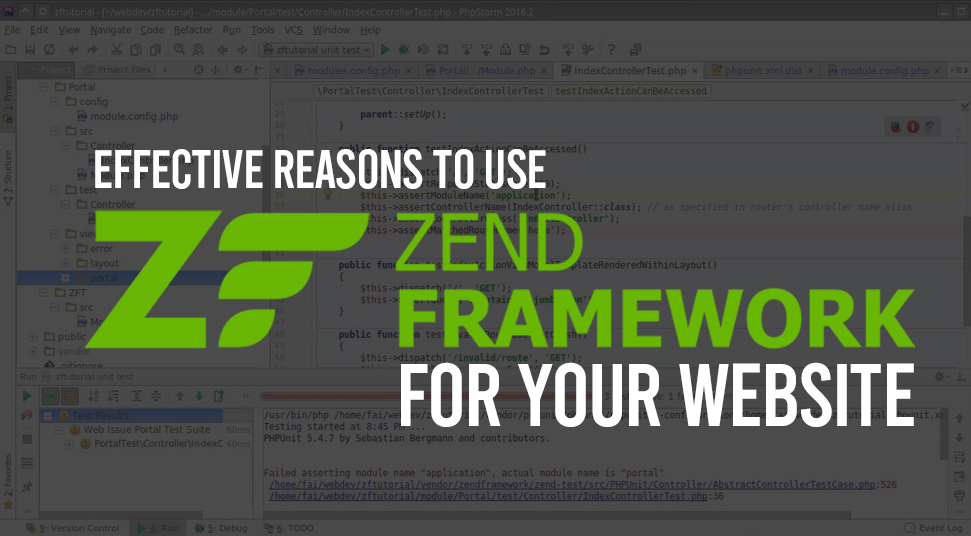Using Zend Framework for your Website: The Effective Reasons

Before we go to the main thing we are here to deal with, let me give you a brief idea about the Zend Framework. Zend Framework is a group of non-manual Personal Home Page (PHP) packages.
It has gained more than 480 million installations. What it can be used for is to develop web applications and services with the usage of PHP 5.6+, and provides complete object-oriented code with the use of a broad gamut of language features.
How does this Work?
Zend Framework functions with the utilization of the composer as a package dependency manager.
It uses PHPUnit to test each and every package. Zend Framework also uses Travis CI as a Continuous Integration service.
It is also inclusive of the contrivance of PSR-7 for HTTP message interfaces along with following PHP-FIG standards.
Currently, the third version, known as Zend Framework 3, is in use after the use of Zend Framework 1 and Zend Framework 2 respectively.
This framework consists of a set of many components such as Authentication, Barcode, Cache, Code, Captcha, Component Installer, Crypt, Debug, Escaper, and many other components.
Reasons to use Zend Framework
If you are in the phase where you are trying very hard to make a decision on the framework to use for your brand new piece of research or project, this article will surely help you understand why Zend Framework is one of the best in such a scenario.
This article will provide in-depth details on the reasons for the usage of Zend Framework for your website.
You may be commencing with a fresh project or you might be thinking of modifying an existing project. In either of the cases, the Zend Framework can be of excellent use as it holds many beneficial characteristics.
Let us head in with the reasons to use it for a website.
Formal Partnership
Zend Framework is connected with many popular firms like Microsoft and IBM through partnerships. This helps in providing interfaces that are easy to get along with website developers to work with.
As the number of the main sponsors gets limited, the ability of the developers reduces when they are retrieving various modern web services to perk up the functionality of the platform.
Expand Classes in the Best Possible Way you can
As Zend Framework is a completely object-oriented framework, it uses a thousand of object-oriented (OO) convictions such as inheritance and interfaces. If not all, it makes up most of the Zend Framework’s constituents expandable to a significant point.
ZF gives the developers permission to put into action their own special variations of respective components without hacking the ZF codebase itself. As you get the chance of customizing the framework in this manner, it allows you to build up operability. This functionality is unique to the project.
But, because of the object-oriented character of this framework, you will be capable of using this functionality in any other project also. Let me Make this Point a Bit More Clear with the Help of an Example
This framework has a very wide Validation component that you can utilize for validating data arriving from forms. Here forms are objects and are represented by the Zend_form element.
Consider that you want to make a customized URL validator to resist URL input from the user. The fastest method to do this is just validating the input using:
$isValid = filter_var($submitted_url, FILTER_VALIDATE_URL);
Doing this will not stick to the OO attributes of form objects as it is not within the context of the form. For solving this, you are allowed to make a fresh zend_Validator class by extending the Zend_Validator class by expanding the Zend_Valiate_Abstract class:
<?php
class Zend_Validate_Url extends Zend_Validate_Abstract
{
const INVALID_URL = ‘invalidUrl’;
protected $_messageTemplates = array(
self::INVALID_URL => “‘%value%’ is not a valid URL.”,
);
public function isValid($value)
{
$valueString = (string) $value;
$this->_setValue($valueString);
if (!Zend_Uri::check($value)) {
$this->_error(self::INVALID_URL);
return false;
}
return true;
}
}
This code will use the Zend_Uri class, which is already having a URL checking method that you will be able to use.
But, as it does not increase the Zend_Validate_Abstract class, a wrapping class is applied that executes the required abstract class.
This will let you use the Zend_Uri URL checking operation in your Zend_form objects like so:
<?php
class Form_Site extends Zend_Form
{
public function init()
{
$this->setMethod(‘POST’);
$this->setAction(‘/index’);
$site= $this->createElement(‘text’, ‘siteurl’);
$site->setLabel(‘Site URL’);
$site->setRequired(true);
// Adding the custom validator here!
$site->addValidator(new Zend_Validate_Url());
$this->addElement($site);
$this->addElement(‘submit’, ‘sitesubmit’, array(‘label’ => ‘Submit’));
}
}
If you desire to check that the URLs are valid YouTube video links, you can do the following thing.
<?php
class Zend_Validate_YouTubeUrl extends Zend_Validate_Abstract
{
const INVALID_URL = ‘invalidUrl’;
protected $_messageTemplates = array(
self::INVALID_URL => “‘%value%’ is not a valid URL.”,
);
public function isValid($value)
{
$valueString = (string) $value;
$this->_setValue($valueString);
if (strpos($value, “http://www.youtube.com/watch?v=”) !== 0) {
$this->_error(self::INVALID_URL);
return false;
}
return true;
}
}
If we adjoin this code to the website form object in the form of a validator, it will make you sure that all the addresses presented to start with the right YouTube video URL prefix.
The OO Dignity
The above example in the first reason clearly mentions that the Zend Framework is all about an object. Although it makes things a bit more complicated it gives us a great advantage. The benefit you get is the ability to make the code recyclable. This is a plus point as nobody does repeat the codes.
You can use Exactly what you Need and Omit the Other Things
Zend framework is just a bunch of classes on the basis of the design. Typically, anyone will use Zend MVC components to make a fully-operational ZF project. On the other hand, you will just be able to load the elements you require.
ZF is very unique and it signifies you can get the advantage of the components as respective libraries, instead of the entire framework.
You might be familiar with the term called glue framework if you go through various articles on frameworks. ZF is a glue framework whose unique feature makes it easy to use as ‘glue’ to your already existing application.
An Example
If you are extracting information on a specific video on YouTube, you can use Zend_Gdata_youtube, a ZF component. It allows you accessing data from YouTube through the GData API. this is how you need to do it:
//Make sure you load the Zend_Gdata_Youtube class, this assumes ZF is in your PHP’s include_path
include_once “Zend/Gdata/Youtube.php”;
$yt = new Zend_Gdata_YouTube();
// getVideoEntry takes in the YouTube video ID, which is usually the letters at the end
// of a YouTube URL e.g. http://www.youtube.com/watch?v=usJhvgWqJY4
$videoEntry = $yt->getVideoEntry(‘usJhvgWqJY4’);
echo ‘Video: ‘ . $videoEntry->getVideoTitle() . “<br />”;
echo ‘Video ID: ‘ . $videoEntry->getVideoId() . “<br />”;
echo ‘Updated: ‘ . $videoEntry->getUpdated() . “<br />”;
echo ‘Description: ‘ . $videoEntry->getVideoDescription() . “<br />”;
echo ‘Category: ‘ . $videoEntry->getVideoCategory() . “<br />”;
echo ‘Tags: ‘ . implode(“, “, $videoEntry->getVideoTags()) . “<br />”;
echo ‘Watch page: ‘ . $videoEntry->getVideoWatchPageUrl() . “<br />”;
echo ‘Flash Player Url: ‘ . $videoEntry->getFlashPlayerUrl() . “<br />”;
echo ‘Duration: ‘ . $videoEntry->getVideoDuration() . “<br />”;
echo ‘View count: ‘ . $videoEntry->getVideoViewCount() . “<br />”;
Multifunctional Trait
This framework is a storehouse of several functions. Any Really Simple Syndication (RSS) you need, Zend_Feed allows you to read any of them.
Zend_form will help to create any new form you want to bring into being. Zend_Acl will allow you to administer the resources.
For that authentication of a user, you can use Zend_Auth.
Let’s Wrap Up
To make the website more user-friendly and full of features, Zend Frameworks provide many such functions.
These are the reasons that prove that the Zend Framework is one of the most ideal frameworks for your website.
If you are planning on developing a platform and will soon get started with it, this article will be helping you by letting you know about this particular set of professional PHP packages.
Comment in the section provided below to let us know if this article was useful. Visit the other articles that we have published to know about related subjects.

 Stars-923: Unveiling the Mystical Cosmos
Stars-923: Unveiling the Mystical Cosmos  Buying Guide for Short-Throw 4K Projectors for Gaming
Buying Guide for Short-Throw 4K Projectors for Gaming  5 Best Wireless Apple CarPlay Adapters in 2024
5 Best Wireless Apple CarPlay Adapters in 2024  The Essential Role of Animated Explainer Videos in Tech Documentation
The Essential Role of Animated Explainer Videos in Tech Documentation  How Do You Apply Agile Testing Principles And Practices Across Different Domains And Contexts?
How Do You Apply Agile Testing Principles And Practices Across Different Domains And Contexts?  What Are The Benefits And Challenges Of Using Mock Objects In TDD?
What Are The Benefits And Challenges Of Using Mock Objects In TDD?